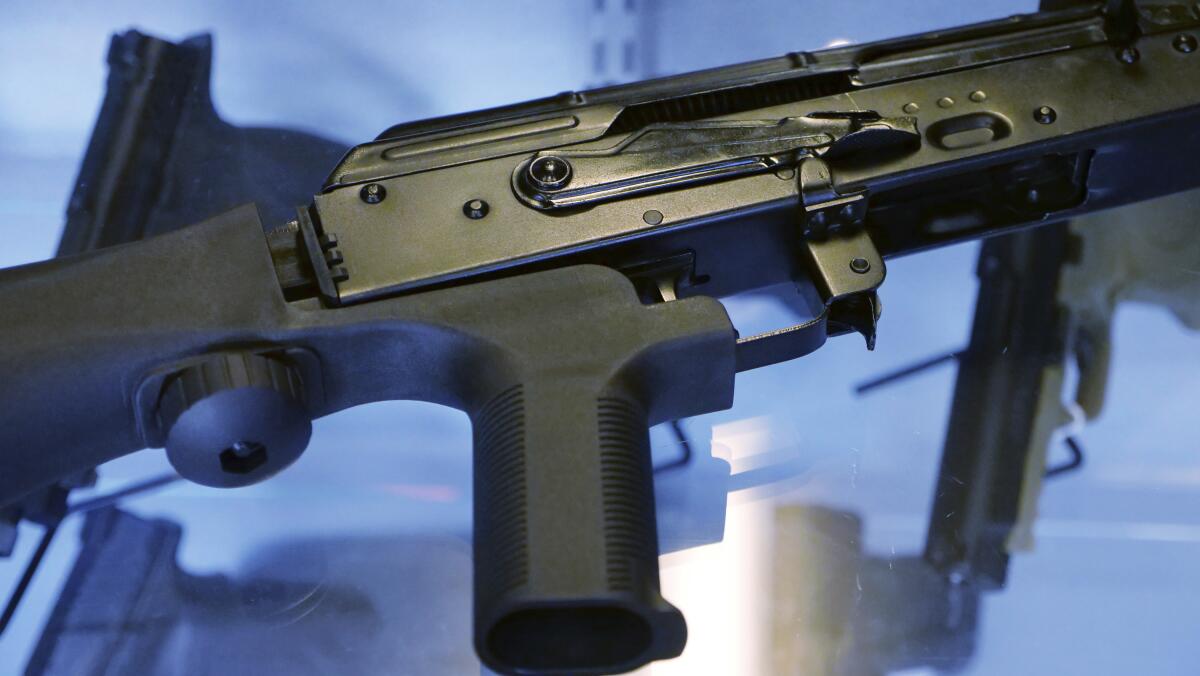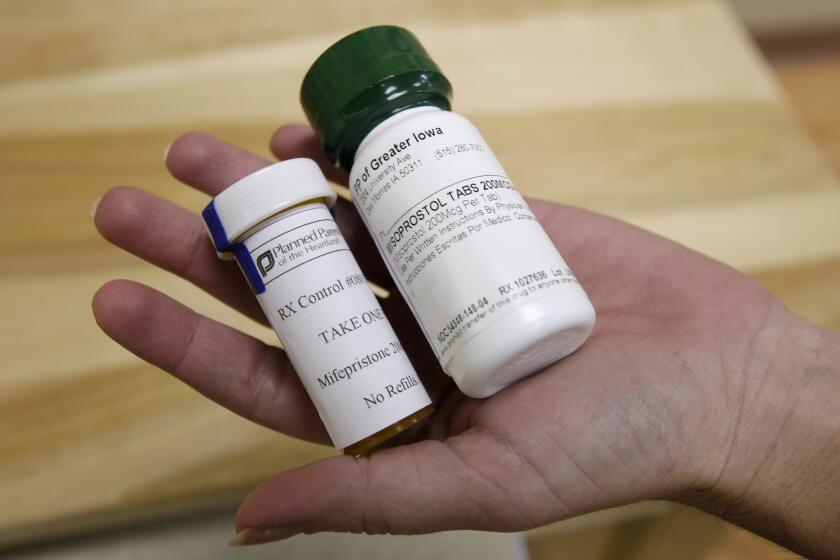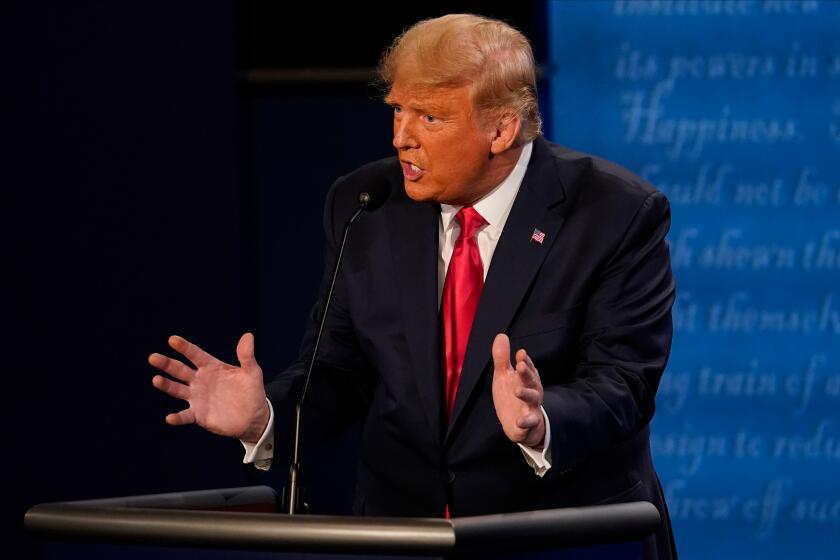Supreme Court strikes down ban on rapid-fire bump stocks like those used in Las Vegas mass shooting

- Share via
WASHINGTON — The Supreme Court on Friday struck down a federal ban on bump stocks like those used in the nation’s deadliest mass shooting, when 60 people were killed and 500 wounded at an outdoor concert in Las Vegas in 2017.
In a 6-3 decision, the justices rejected the views of the Biden and Trump administrations and ruled that bump stocks could not be prohibited as illegal machine guns because the trigger action operates in a different way.
The court’s six conservatives were in the majority and the three liberals dissented.
Supreme Court makes the right call on challenge to medication abortion’s safety, but the fight over reproductive rights in the U.S. is far from over.
While the ruling wipes out the federal regulation, bump stocks remain illegal under California law.
Justice Clarence Thomas, speaking for the court, said bump stocks do not meet the definition of a machine gun.
“A semiautomatic rifle equipped with a bump stock does not fire more than one shot by a single function of the trigger,” he wrote in Garland vs. Cargill. “All that a bump stock does is accelerate the rate of fire by causing these distinct [functions] of the trigger to occur in rapid succession.”
In dissent, Justice Sonia Sotomayor said that a bump stock does work like a machine gun.
“When I see a bird that walks like a duck, swims like a duck, and quacks like a duck, I call that bird a duck,” she wrote. “A bump-stock-equipped semiautomatic rifle fires automatically more than one shot, without manual reloading, by a single function of the trigger. ... I, like Congress, call that a machine gun.”
Justices Elena Kagan and Ketanji Brown Jackson agreed with Sotomayor.
Gun safety advocates say Congress needs to take up the issue again.
“Guns outfitted with bump stocks fire like machine guns, they kill like machine guns, and they should be banned like machine guns — but the Supreme Court just decided to put these deadly devices back on the market,” said John Feinblatt, president of Everytown for Gun Safety. “We urge Congress to right this wrong and pass bipartisan legislation banning bump stocks, which are accessories of war that have no place in our communities.”
Justice Samuel A. Alito Jr. agreed that it was time for Congress to act.
“The horrible shooting spree in Las Vegas in 2017 did not change the statutory text or its meaning,” he wrote in a concurring opinion on the ruling. “That event demonstrated that a semiautomatic rifle with a bump stock can have the same lethal effect as a machine gun, and it thus strengthened the case for amending. Now that the situation is clear, Congress can act.”
Senate Majority Leader Charles E. Schumer (D-N.Y.) denounced the decision, saying: “Senate Democrats are ready to pass legislation to ban bump stocks, but we will need votes from Senate Republicans.”
While California will continue to enforce its ban, state Atty. Gen. Rob Bonta said a federal ban on bump stocks would make the state’s law more effective.
“Federal laws that apply on a nationwide basis serve as an important complement to state firearms laws that protect our residents and communities from gun violence,” he said.
The case decided Friday did not involve the 2nd Amendment. Instead, it turned on how machine guns were described when Congress prohibited their sale. They were defined as weapons that fire automatically with a single pull of the trigger.
The Las Vegas shooter had an arsenal of assault-style rifles in his hotel room overlooking the site of the 2017 concert. Authorities later said 14 of his weapons were fitted with bump stocks that had enabled him to fire more than 1,000 rounds in 11 minutes.
In response to the shooting, then-President Trump ordered federal regulators to reclassify bump stocks as illegal machine guns because they allow a shooter to fire hundreds of rounds per minute. Biden administration attorneys defended that rule.
Congress first restricted machine guns in 1934 in response to the gangland murders during Prohibition, including the Valentine’s Day massacre in Chicago. Since then, Congress has revised and updated the ban several times.
In case involving a California man, Supreme Court rejects trademarks that rely on a person’s name, including former President Trump.
More than 500,000 bump stocks were said to be in private hands when the Bureau of Alcohol, Tobacco, Firearms and Explosives issued its ban in 2018, and owners were told to turn in the devices or destroy them.
Michael Cargill, a Texas gun store owner, turned in his two bump stocks, but sued to challenge the law.
He won before the conservative 5th Circuit Court of Appeals in New Orleans, which said the wording of the law was ambiguous.
U.S. Solicitor Gen. Elizabeth Prelogar appealed and urged the Supreme Court justices to restore the ban.
A major gun rights case is still pending before the justices this term.
At issue in that case, U.S. vs. Rahimi, is a federal law that authorizes judges to deny guns to those accused of domestic violence. The 5th Circuit Court has ruled that this provision violates the 2nd Amendment, and the justices are due to hand down a ruling soon on the Biden administration’s appeal.
The justices are also considering whether to take up several appeals from Illinois that contend that the state’s ban on assault weapons violates the 2nd Amendment.
If the court votes to hear the appeals, it will cast doubt on California’s long-standing ban on rapid-fire weapons.
More to Read
Sign up for Essential California
The most important California stories and recommendations in your inbox every morning.
You may occasionally receive promotional content from the Los Angeles Times.













